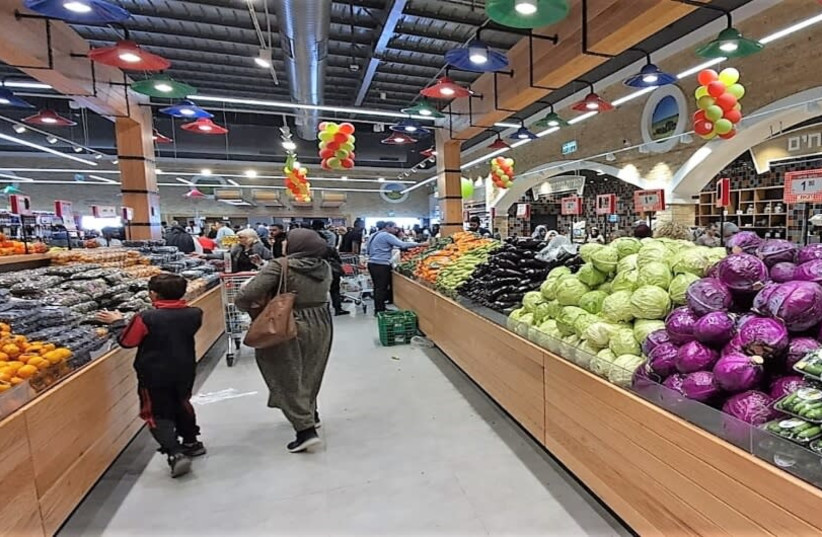The government will reduce the cost of living by NIS 4 billion, Prime Minister Naftali Bennett announced on Wednesday, with the working family at the center of the plan.
“We will reduce the tax per employee by NIS 223 per month for every child [of theirs] between the age of six and 12,” said the prime minister.
Working families who pay taxes will benefit from an additional credit point per spouse in 2022, for each child age six to 12. The potential value of the benefit in a family where both spouses work therefore reaches up to NIS 5,352 per year, per child. About 530,000 tax-paying parents are expected to benefit from the plan.
“Treating the cost of living is not a magic formula,” said Finance Minister Avigdor Liberman, at the joint news conference with Bennett and Economy Minister Orna Barbivai. “These are complex, long-term processes. At the same time, we are not giving up on the issue, and continue to take responsibility, even today. We have formulated important steps that will encourage employment, increase income and reduce the cost of living – this time, using a revolutionary model in which we focus on citizens who work and pay taxes.”
Also on the docket to reduce the cost of living is a decrease in taxes for a wide range of everyday products: “We are reducing tariffs on a variety of consumer products like meat, fish, flour, olive oil, eggs – things that everyone uses,” said Bennett. “Also furniture and kitchen utensils.”
The move is intended to reduce costs in the food sector, enable the reduction of imported products, and increase the competitiveness of the Israeli market. The government will also abolish tariffs on a variety of consumer and industrial products, as well as construction materials, medical equipment and automotive parts.
Additionally, the government will increase the subsidy for after-school care for children age three to eight in lower-middle-class families.
Furthermore, employees who are entitled to a negative income tax (approximately 300,000 individuals) will receive a one-time increase of 20% in 2022. The average amount is NIS 800 per year per employee, and can reach up to NIS 1,700 per year for mothers of three children.
In response to the recently increased tariff on electricity, the Finance Ministry is also implementing a one-time reduction of the excise duty on coal for 2022. By doing so, the increase in the electricity tariff for households, businesses and industry will be reduced by an average of about 2.4%.
Finally, the government has committed to establishing a committee to reduce monopolistic activity and increase competition in the food market, by mapping the market, industry players, market shares, level of profitability, price levels and mergers and acquisitions made in recent years in comparison to other developed countries. The committee will recommend active measures to reduce centralization and increase competition, as well as legislative amendments as needed.
In the days leading up to the announcement, it was expected that the ministers would use this platform to announce how the government intends to grant aid and compensation to small-business owners and the self-employed. Bennett did not address the issue directly during his speech, focusing instead on the cost of living in general; Barbivai noted that they "haven't mentioned aid to businesses, but not because we don't see them," explaining that the issue of aid to businesses will yet be addressed in the future.
Prices in Israel have been on the rise over the last year. The Consumer Price Index, the nation’s primary measurement in calculating inflation, has risen steeply since the beginning of 2021. As of December, the CPI had risen by 2.8%, a small number relative to other countries’ inflation rates during the same period, with Brazil’s weighing in at a massive 10%.
But considering Israel’s position as one of the world’s most expensive countries – second only to Switzerland, according to the OECD – the figure has generated much ado regarding the rising cost of living.
“Although the global price increase is relatively hitting Israel moderately compared with other countries, we feel it strongly, because it sits upon very high prices in the first place,” Bennett said during a news conference earlier this week. “We need to see the situation as an opportunity – an opportunity to address structural, long-term failures that have led to a decade of price increases.”
Former Knesset Finance Committee chairman Moshe Gafni called the economic plan “too little, too late. In only several months, you inflicted immeasurable damage by raising taxes, with new laws and passing a bad budget that harms middle-class families, independent workers and small and mid-size businesses,” Gafni said in a message to Bennett and Liberman. “Now you are fixing part of it and hoping for credit.”
Gil Hoffman contributed to this report.

